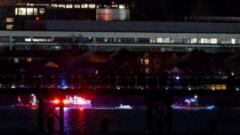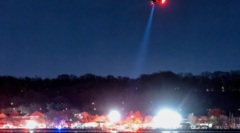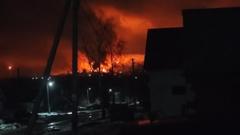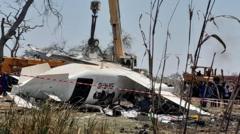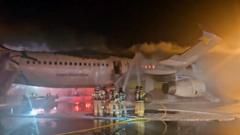Azerbaijan Airlines has accused external interference for the crash of its Embraer jet, resulting in 38 fatalities, while intensifying scrutiny over its relationship with Russia and safety concerns in the region.
Azerbaijan Airlines Attributes Plane Crash to 'External Interference'
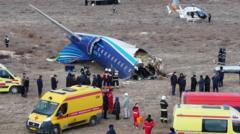
Azerbaijan Airlines Attributes Plane Crash to 'External Interference'
Investigation finds evidence of possible attack as Azerbaijan Airlines suspends flights to Russia.
Azerbaijan Airlines has recently declared that preliminary investigations into the crash of one of its planes in Kazakhstan have pointed to "physical and technical external interference" as the primary cause. The tragic incident, which occurred on December 25, resulted in 38 fatalities when the aircraft lost speed and crashed approximately 3 kilometers short of Aktau airport.
Initially intended for Grozny airport in southern Russia, the flight was forced to change its course; witnesses recounted an explosion moments before the diversion across the Caspian Sea towards Kazakhstan. Dmitry Yadrov, head of Russia’s civil aviation authority, described a complicated situation in Chechnya, stating that Ukrainian combat drones were allegedly conducting attacks on civilian infrastructure in Grozny and the surrounding areas. Consequently, a 'Carpet plan' was instated, which called for the urgent departure of all aircraft from the affected airspace.
While Azerbaijan Airlines refrained from detailing the nature of the purported interference, aviation experts speculate that the aircraft may have suffered damage from shrapnel attributed to Russian air-defense missile explosions. Veteran Azerbaijani pilot Tahir Agaguliev posited that missile fragments likely compromised the hydraulic systems crucial to the plane’s controls.
Among the 29 survivors, flight attendant Zulfuqar Asadov noted that the aircraft appeared to suffer an "external strike," triggering chaos onboard just before the second impact resulted in injuries to his arm. In response to the tragedy, Azerbaijan Airlines announced a suspension of flights to seven Russian cities citing security concerns, following an earlier halt of services to Grozny and Makhachkala. Other airlines, including Israel's El Al, have also ceased operations to Moscow, reflecting the rising tension in the region.
Ukrainian presidential spokesperson Andriy Yermak called on Russia to be held accountable for the incident. However, the Kremlin has chosen to remain silent, stating, "An investigation into this aviation incident is underway," and limiting their comments on the claims of the plane being struck by Russian air defenses.
Memorials have been organized in Azerbaijan to pay tribute to the pilots who managed to steer the aircraft to safety amidst chaos, ultimately sacrificing their lives in the process. Meanwhile, Kazakh authorities are cooperating with the Azerbaijani government for the ongoing investigation but have withheld specifics regarding their findings. Sources in Baku suggest that while both Russia and Kazakhstan proposed a joint investigative committee from the Commonwealth of Independent States (CIS), Azerbaijan has insisted on an international inquiry to ensure impartiality.
Initially intended for Grozny airport in southern Russia, the flight was forced to change its course; witnesses recounted an explosion moments before the diversion across the Caspian Sea towards Kazakhstan. Dmitry Yadrov, head of Russia’s civil aviation authority, described a complicated situation in Chechnya, stating that Ukrainian combat drones were allegedly conducting attacks on civilian infrastructure in Grozny and the surrounding areas. Consequently, a 'Carpet plan' was instated, which called for the urgent departure of all aircraft from the affected airspace.
While Azerbaijan Airlines refrained from detailing the nature of the purported interference, aviation experts speculate that the aircraft may have suffered damage from shrapnel attributed to Russian air-defense missile explosions. Veteran Azerbaijani pilot Tahir Agaguliev posited that missile fragments likely compromised the hydraulic systems crucial to the plane’s controls.
Among the 29 survivors, flight attendant Zulfuqar Asadov noted that the aircraft appeared to suffer an "external strike," triggering chaos onboard just before the second impact resulted in injuries to his arm. In response to the tragedy, Azerbaijan Airlines announced a suspension of flights to seven Russian cities citing security concerns, following an earlier halt of services to Grozny and Makhachkala. Other airlines, including Israel's El Al, have also ceased operations to Moscow, reflecting the rising tension in the region.
Ukrainian presidential spokesperson Andriy Yermak called on Russia to be held accountable for the incident. However, the Kremlin has chosen to remain silent, stating, "An investigation into this aviation incident is underway," and limiting their comments on the claims of the plane being struck by Russian air defenses.
Memorials have been organized in Azerbaijan to pay tribute to the pilots who managed to steer the aircraft to safety amidst chaos, ultimately sacrificing their lives in the process. Meanwhile, Kazakh authorities are cooperating with the Azerbaijani government for the ongoing investigation but have withheld specifics regarding their findings. Sources in Baku suggest that while both Russia and Kazakhstan proposed a joint investigative committee from the Commonwealth of Independent States (CIS), Azerbaijan has insisted on an international inquiry to ensure impartiality.












